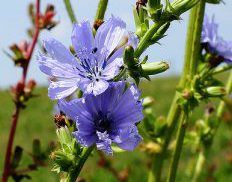Chicory (Cichorium intybus)
Identification:
Chicory is a perennial plant that is commonly cultivated and also found wild in the U.S. and Europe. The rootstock is light yellow outside, white inside, and, like the rest of the plant, contains a bitter, milky juice.
The stiff, angular, branching stem bears lanceolate leaves that are coarsely toothed near the bottom of the plant, but entire higher up. The light-Blue to Violet-Blue, axillary or terminal flowerheads feature rays that are toothed at the ends.
Family: Compositae (Sunflower family)
Other Names: Succory, Wild chicory, Wild succory
Flowers: June – September
Parts Used: Roots and leaves
Habitat: Roadsides, fields, and waste places. Throughout our area. (Alien)
Properties: Appetizer, Cholagogue, Digestive, Diuretic, Tonic.
Main Uses:
Chicory is often recommended for jaundice and for spleen problems. The juice of the leaves and a tea made from the flowering plant promote the production of bile, the release of gallstones, and the elimination of excessive internal mucus. They are also useful for Gastritis, lack of appetite, and digestive difficulties.
A decoction of the rootstock is said to be beneficial to the glandular organs of the digestive system. For painful inflammations, try applying the boiled leaves and flowers wrapped in a cloth.
Preparation And Dosages:
Gather the rootstock from March to May.
Decoction: Use 1 teaspoon rootstock or herb per 1/2 cup of cold water; bring to a boil and strain. Take 1 to 1-1/2 cups a day, a mouthful at a time.
Juice: Take 1 tablespoon in milk or water, three times a day. Chicory is also a wild food.
Nutrients (Per 100 grams) Calories – 20 Niacin – 0.5 mg. Riboflavin – 0.10mg. Calcium – 86 mg. Phosphorus – 40 mg. Thiamin – 0.06 mg. Fat – 0.3 grams. Potassium – 420 mg. Vitamin A – 4.000 IU Iron – 0.9 mg. Protein – 1.8 grams. Vitamin C – 22 mg.
Uses: Coffee, salad, cooked green.
The roots make an excellent coffee substitute, (without the caffeine), when roasted in an oven until dark brown and brittle, ground, and prepared like coffee; use roughly 1-1/2 teaspoons chicory for each cup of water. The very young leaves can be eaten fresh in salads and the older, bitter leaves can be boiled in several waters and eaten.
Get your herbs and oils at a place you can trust!
Starwest Botanicals not only utilizes their own milling and packaging operations for all organic herbs and bulk spices, they also conduct quality control testing on each and every product in their own laboratory.
With attention like that, you can be sure you will receive only the highest-quality organic herbs, dried herbs, organic spices, therapeutic essential oils and all natural products when you place an order with Starwest Botanicals.


 Fill out the form below to sign up to our free natural health and healing newsletter and stay up to date on our latest articles about holistic healing therapies and effective home remedies for common ailments. As a thank you for joining our newsletter, we’ll also send you
Fill out the form below to sign up to our free natural health and healing newsletter and stay up to date on our latest articles about holistic healing therapies and effective home remedies for common ailments. As a thank you for joining our newsletter, we’ll also send you